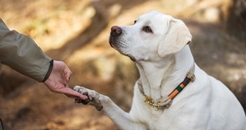 The effect of a dog in school
The effect of a dog in school
The Department of Education in New York City launched a ‘Comfort Dog Pilot Program’ in seven schools in autumn 2016. It expanded to forty-two primary and secondary schools in September 2017.
The programme builds on research by Yale University on how humans interact with dogs which have developed skills that make them adept at understanding social and emotional cues from humans. The research concluded that there is early evidence that dogs might reduce stress.
Following this research, institutions such as nursing homes started to bring in dogs as a way to reduce stress in their clients. In schools, in addition to offering ordinary comfort, some of the dogs are deployed in teachers’ lesson plans to encourage empathy, cooperation and decision-making.
One school reports that the dog they have has had a positive effect on both students and teachers. Attendance at counselling sessions has picked up because kids want to see the dog, and her presence in the meetings gets students to talk more openly. She has helped kids in crisis, offering elemental comfort that humans could not provide. And she sets a welcoming tone at school that has proved helpful in lowering tension. She has completely calmed students who were agitated and about to get in a conflict.
“A comfort dog is a counselling support. They possess the two most important qualities of an effective social worker or counsellor--unconditional acceptance and warmth.” says Jaye Murray, Executive Director of the Office of Counselling Support Programs.
Others have observed similar reactions and also report positive effects with children from challenging backgrounds – seemingly filling unmet emotional needs.
Schools recognise that some pupils might not want to interact with dogs, either because of allergies, fear or a cultural inhibition. Parents are offered a “positive option” that they had to sign before their child could interact with a dog.
Further research is needed but the concept seems to be contributing towards improving students’ social and emotional well-being.
Retweet about this article:
Geoff Knott, 21/03/2018